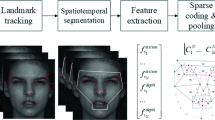Abstract
Video is a recursively measured signal where frames are highly correlated with structured sparsity and low-rankness. A simple example is facial expression - multiple measurements of a face. Several salient facial action units (AU) are often enough for a correct expression recognition. We hope that AUs are not stored when the face remains neutral until they become salient when expression occurs, as well as that the recognizer is still able to restore historic salient AUs. A temporal memory mechanism is appealing for a real-time system to reduce rich redundancy in information coding. We formulate expression recognition as a video Sparse Representation based Classification (SRC) with Long Short-Term Memory (LSTM) mechanism, which is applicable for human actions yet requiring a careful design of sparse representation due to possible changing scenes. Preliminary experiments are conducted on the MPI Face Video Database (MPI-VDB). We compare the proposed sparse coding with temporal modeling using LSTM against the baseline of sparse coding with simultaneous recursive matching pursuit (SRMP).
Access this chapter
Tax calculation will be finalised at checkout
Purchases are for personal use only
Similar content being viewed by others
References
Xiang, X., Tran, T.D.: Pose-selective max pooling for measuring similarity. In: IAPR International Conference on Pattern Recognition (ICPR) Workshops (2016)
Xiang, X., Dao, M., Hager, G.D., Tran, T.D.: Hierarchical sparse and collaborative low-rank representation for emotion recognition. In: IEEE International Conference on Acoustics, Speech and Signal Processing (ICASSP), pp. 3811–3815. IEEE (2015)
Chen, S., Donoho, D.: Basis pursuit. In: 1994 Conference Record of the Twenty-Eighth Asilomar Conference on Signals, Systems and Computers, vol. 1, pp. 41–44. IEEE (1994)
Cotter, S.F., Rao, B.D., Engan, K., Kreutz-Delgado, K.: Sparse solutions to linear inverse problems with multiple measurement vectors. IEEE Trans. Signal Process. 53(7), 2477–2488 (2005)
Hochreiter, S., Schmidhuber, J.: Long short-term memory. Neural Comput. 9(8), 1735–1780 (1997)
Socher, R., Lin, C.C., Manning, C., Ng, A.Y.: Parsing natural scenes and natural language with recursive neural networks. In: Proceedings of the 28th International Conference on Machine Learning (ICML 2011), pp. 129–136 (2011)
Author information
Authors and Affiliations
Corresponding author
Editor information
Editors and Affiliations
Rights and permissions
Copyright information
© 2017 Springer International Publishing AG
About this paper
Cite this paper
Xiang, X., Tran, T.D. (2017). Recursively Measured Action Units. In: Schwenker, F., Scherer, S. (eds) Multimodal Pattern Recognition of Social Signals in Human-Computer-Interaction. MPRSS 2016. Lecture Notes in Computer Science(), vol 10183. Springer, Cham. https://doi.org/10.1007/978-3-319-59259-6_13
Download citation
DOI: https://doi.org/10.1007/978-3-319-59259-6_13
Published:
Publisher Name: Springer, Cham
Print ISBN: 978-3-319-59258-9
Online ISBN: 978-3-319-59259-6
eBook Packages: Computer ScienceComputer Science (R0)




